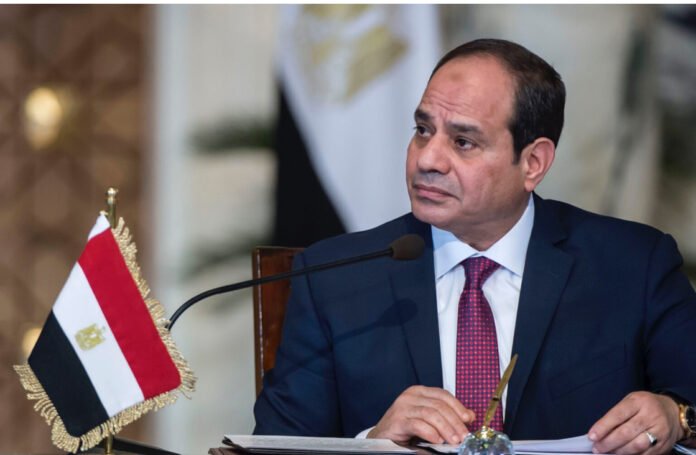Tuesday, July 8, 2025
Cairo — (Horn Africa News) — In a bold and strategic move, Egypt has declared its firm opposition to Ethiopia’s attempts to secure access to the Red Sea through a controversial deal with Somaliland and has pledged to expand its military and diplomatic cooperation with Somalia. The development marks a significant escalation in regional tensions in the Horn of Africa, as Cairo positions itself as a staunch defender of Somali sovereignty and Red Sea security.
The declaration came during an official state visit by Somali President Hassan Sheikh Mohamud to Cairo, where he met with Egyptian President Abdel Fattah el-Sisi for high-level discussions. The summit culminated in a joint press conference where President el-Sisi made Egypt’s position unmistakably clear.
“Egypt will not tolerate any actions that jeopardize the sovereignty of Somalia or threaten the security of the Red Sea, which is a lifeline for international trade,” el-Sisi said. “We stand by Somalia and by the principles of international law and territorial integrity.”
A Warning to Addis Ababa
The Egyptian stance directly challenges Ethiopia’s efforts to gain naval access through a memorandum of understanding signed in January 2024 with Somaliland, a self-declared republic that broke away from Somalia in 1991 but remains unrecognized by the international community.
The deal grants Ethiopia a 50-year lease on a stretch of Somaliland’s coastline near the port of Berbera in exchange for potential recognition of Somaliland’s independence. Addis Ababa sees this as a vital step to end its landlocked status, but the agreement has sparked outrage in Mogadishu and drawn strong condemnation from regional actors—most notably, Egypt.
Cairo fears that Ethiopia’s growing maritime ambitions could threaten the security of the Red Sea and the Suez Canal, one of the world’s most important maritime trade routes and a key source of Egyptian revenue and geopolitical influence.
Strategic Military Cooperation with Somalia
In response, Egypt is not only issuing diplomatic warnings but also reinforcing its military presence and alliances in the Horn of Africa. President el-Sisi confirmed that Egypt will deepen its military cooperation with Somalia, building on a 2023 defense agreement under which Egyptian forces have already been training elite Somali units in counterterrorism and anti-insurgency operations.
“We are expanding our support to the Somali National Army,” said el-Sisi. “This includes the provision of advanced military equipment, enhanced intelligence sharing, and joint exercises focused on coastal and maritime security.”
Sources close to the talks also revealed that Egypt is considering contributing personnel and logistics support to a future African Union-led peacekeeping mission in Somalia—pending regional and international coordination.
Somalia’s Response: Unity and Sovereignty First
President Hassan Sheikh Mohamud welcomed Egypt’s strong stance, stating that it aligns with Somalia’s own goals of defending national sovereignty and preserving regional stability.
“A stronger Somali army is the key to preserving our sovereignty and shutting the door to foreign interference,” President Mohamud said. “Egypt’s support is a crucial step toward building a stable and self-reliant Somalia.”
He added that Somalia would never recognize any agreement that undermines its territorial integrity and vowed to take diplomatic action against what he called “illegal dealings” between Ethiopia and Somaliland.
Coordinated Regional Diplomatic Push
The Cairo summit also produced a broader diplomatic roadmap. Both Egypt and Somalia announced their intent to present a unified position at upcoming African Union and Arab League summits. Their goal is to rally opposition to the Ethiopia–Somaliland deal and pressure Addis Ababa to respect Somalia’s internationally recognized borders.
Officials also discussed strengthening cooperation in key sectors such as trade, energy, fisheries, and infrastructure, which they see as part of a long-term strategy for regional integration and mutual development.
Ethiopia’s Maritime Gambit Faces Resistance
Ethiopia, which has been without a coastline since Eritrea’s independence in 1993, currently depends on the port of Djibouti for over 90% of its imports and exports. The January 2024 agreement with Somaliland was viewed by many analysts as a dramatic step to reduce this dependency and assert Ethiopia’s growing regional influence.
However, the backlash has been swift and widespread. In addition to Somalia and Egypt, other countries in the Red Sea corridor have expressed concern that unilateral moves could destabilize an already volatile region.
The Red Sea, a vital conduit for energy supplies and commercial shipping, is increasingly contested. Alongside the traditional security risks of piracy and terrorism, the area has become a theater of strategic rivalry among Middle Eastern, African, and global powers.
The Road Ahead: Uncertain Waters
As Egypt and Somalia fortify their alliance, observers warn that the Horn of Africa could be entering a period of heightened geopolitical friction. Analysts say the deepening Cairo–Mogadishu partnership, coupled with Ethiopia’s determination to secure a naval outlet, could reshape the security landscape of the Red Sea and East Africa for years to come.
In the meantime, the fate of Ethiopia’s Red Sea deal remains uncertain, with growing diplomatic pressure, legal scrutiny, and the risk of confrontation looming over the region.





